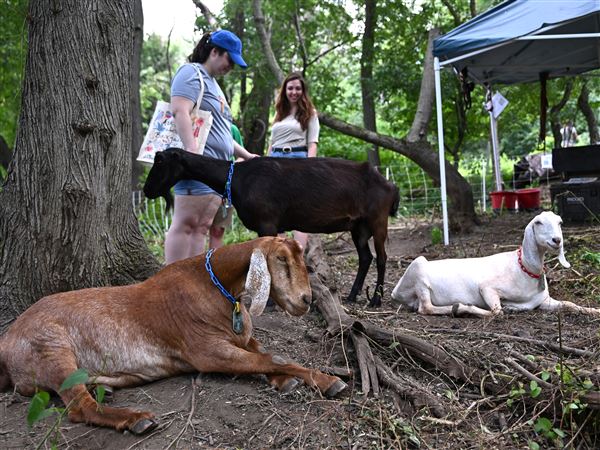Before Steven Kamen, of Butler Township, started renovating houses a year and a half ago, the closest he came to police work was as a bouncer at a bar in New York.
But when he found drug paraphernalia hidden in the walls and ceiling of a house he bought in a bank foreclosure sale, he was intrigued as he watched police gather the illegal material.
He decided he wanted to learn more about police work.
So Mr. Kamen, 48, joined 17 other curious people for 12 weeks of classes at the Pennsylvania State Police barracks in Butler Township.
This year's Citizens Police Academy started Feb. 9 and participants from Butler, Armstrong and Mercer counties are expected to graduate May 4.
"We bring people in and we talk about what a trooper does. They get to see all the different aspects of the police," Trooper Jonathan Bayer said.
Each week, students learn about different topics, including vehicle stops, use of force, canine drug enforcement, homicide, forensics and computer crime. Students not only get to hear firsthand from several troopers, but they are exposed to various pieces of law enforcement equipment, vehicles and technologies.
A lot of time is devoted to debunking myths from the movies and TV, as the following exchange during one recent class shows:
"You know how on the cop shows when they throw spikes on the road, the fugitive's tires explode?" Trooper Bayer asked.
Most of the heads in the class nodded yes.
"Stingers have sharply pointed hollow punches for puncturing tires. But they let the air out slowly so the cars don't blow up or spin out," he said.
"It's very different from TV," said Nancy Hammer, of Butler Township.
Mrs. Hammer, 59, a bookkeeper, signed up for the class because of a deceased friend of the family who was a police officer for the Pittsburgh Housing Authority.
"He would tell us about his work, the strange things that happened," she said.
As a writer of science fiction, Mrs. Hammer also is interested in police technology.
Although state police cars contain on-board computers, global positioning systems and digital cameras, much of the technology is surprisingly low-tech.
When Trooper Bayer opened one cruiser's trunk, he pulled out not only a four-way tire iron and a first aid kit, but also a broom for sweeping broken glass off the road.
Trooper Bayer began with the state police as a "road dog," or patrol trooper, 18 years ago. After patrolling for 16 years, he became a community service officer.
In addition to running the Citizens Police Academy, he participates in parades, gives tours for Scout troops, visits schools and speaks at various community functions.
He said he enjoys talking to civilians and telling them what it's like to be one of Pennsylvania's approximately 4,000 state troopers.
Many students in the class find his lessons and demonstrations entertaining.
"He's funny, isn't he?" asked Tim Wentling, 38, of Butler, who signed up for the class because he's interested in entering law enforcement after 15 years of doing armed security.
Showing students various pieces of equipment troopers carry, Trooper Bayer snapped open an extendable metal stick with a knob on the end.
"That's an asp baton, that's A-S-P," he said.
When he talked about how clothing and accessories are designed to minimize potential harm to officers, he ripped off his own clip tie.
"That's so no one can grab you and swing you around," he said.
And when he demonstrated field sobriety tests, he described how people under the influence weave and talk.
"It's all you can do not to laugh at them," he said.
The state police also run Camp Cadet for boys and girls ages 12 through 15 who would like to learn about the criminal justice system. More than 20 one-week camps will be held this summer throughout the state.
Camp Cadet is structured similarly to training at the police academy. Participants are addressed as Cadet and required to take part in all scheduled activities. The camp focuses on discipline, self-esteem, teamwork, drug and alcohol education, and violence prevention.
Applicants do not have to pay for meals, lodging or programs, but some camps charge an application fee.
For more information about Camp Cadette, visit www.psp.state.pa.us/campcadet.
First Published: March 12, 2006, 5:00 a.m.
















